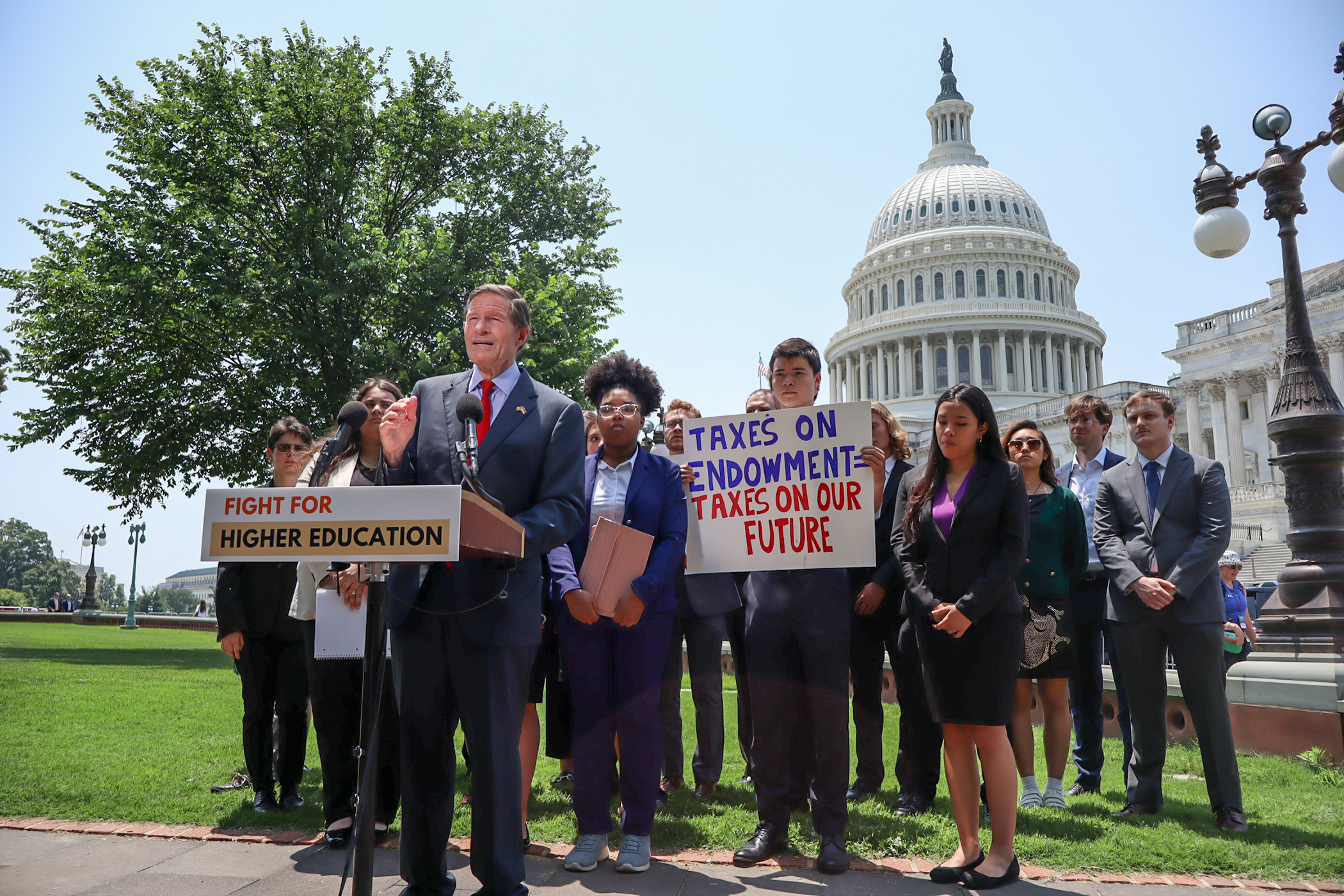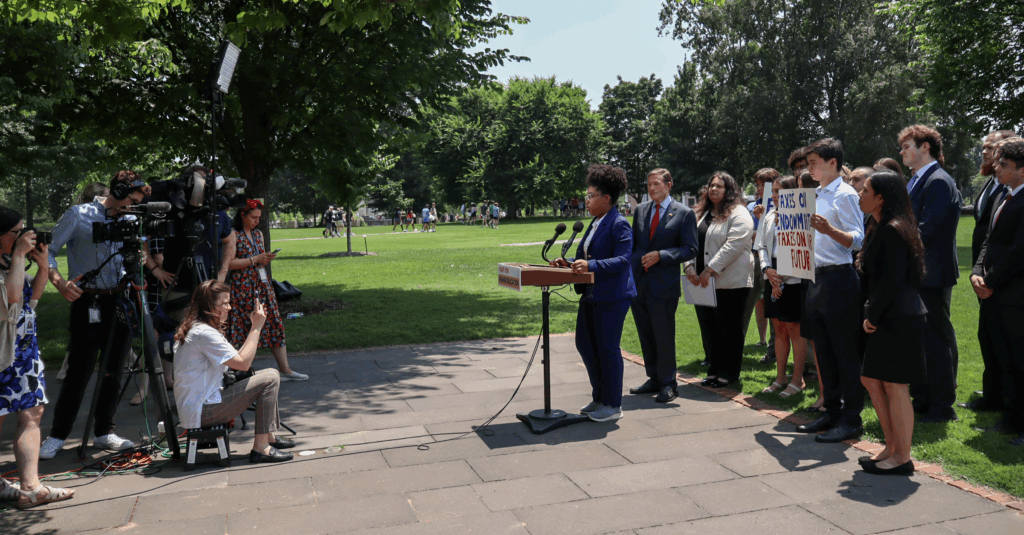Students, lawmakers speak out against Trump tax bill at Washington press conference
On Thursday, Sen. Richard Blumenthal LAW ’73, Rep. Jim Himes, and students from Yale and other universities warned that the bill’s proposed cuts and endowment tax would threaten access to higher education.

Nora Moses, Contributing Photographer
WASHINGTON — At a press conference in front of the United States Capitol on Thursday afternoon, Yale students spoke out against the proposed Republican budget bill.
The event was led by Sen. Richard Blumenthal LAW ’73, a Democrat from Connecticut. Around 25 students — about half from Yale and half from a variety of colleges and universities across the Eastern United States — attended the event. Rep. Jim Himes, a Democrat from Connecticut, also spoke at the press conference.
Blumenthal, Himes and the five student speakers all strongly condemned the Republican reconciliation bill, arguing that it would make higher education significantly less affordable for students, especially those from low-income backgrounds.
“This reconciliation bill is a dream killer, a job killer, a school killer,” Blumenthal said. “It ought to be defeated, and these students are here to make a difference, and they will make a difference because my colleagues are going to listen to them.”
The bill, which passed the House of Representatives in May, would raise the tax on Yale’s endowment from 1.4 to 21 percent, narrow eligibility for Pell Grants, eliminate subsidized student loans and impose a lifetime cap on student borrowing. It has yet to be voted on in the Senate.
The press conference came together after members of the Yale College Democrats reached out directly to Blumenthal with the idea of organizing student action against the bill, organizer Zach Pan ’27 told the News. Yale Dems coordinated with students in other Yale organizations and at nearby universities, launching a nonpartisan “Fight for Higher Education” coalition with a day of action in Washington on Thursday.
In addition to the press conference with Blumenthal and Himes, the group of students met with several U.S. senators and representatives to argue against the bill as part of Thursday’s advocacy day, Pan said.
Yale students received financial support from Yale College for travel costs to the press conference and coaching from the University’s federal relations office, multiple organizers told the News.
Sarah Shapiro, Yale’s director of federal relations, was present at the press conference and was seen directing students to their next advocacy meeting afterwards. Shapiro told the News that she did not have time to speak and declined to comment on her involvement with the advocacy.
Student speeches at the press conference recalled University President Maurie McInnis’ public statement condemning the bill, which she released in May when it was approved by the House of Representatives. In that message, McInnis urged members of the Yale community to contact their senators and advocate against the bill’s passage in the Senate.
Yale has continued to voice its opposition to the budget proposal in the weeks since, using social media to urge community members to “tell Congress to protect discovery and opportunity” and “speak up for the future.” In one Instagram post, the University warned that the plan could threaten its ability to keep 85 percent of undergraduates debt-free and offer tuition-free education to many students — arguments that student speakers at the press conference underscored with their personal testimonies.

“This time last year, I was gearing up to head off to college — an insane miracle dream that somehow came true,” Cayla Waddington ’28 said at the conference. “A dream that wouldn’t be possible without financial aid funded by Yale’s endowment, a dream that this ‘big, beautiful bill’ aims to threaten.”
She said that her story is shared by thousands of students across the country.
“Unlike many of my peers now at Yale, I did not have a so-called ‘dream school’ when I was applying to college. Instead, my dream was to be able to afford college,” said Emi Glass ’26, explaining that the Pell Grant and Yale’s financial aid made a Yale education possible for her.
West Virginia University student Jackson Howe stressed that financial aid programs like Pell Grants are essential for rural and low-income students in states like West Virginia, where access to opportunity is already limited.
Howe called on lawmakers to protect aid that makes higher education possible for students in communities like his.
“I didn’t come to D.C. just to speak. I came to be heard because this is personal,” Howe said. “It’s about every student being told through budget cuts and political games that their future doesn’t matter, but it does. West Virginia matters. Rural students matter. Low income students matter, and we are not going anywhere.”
Riley Getchell ’27, a first-generation low-income student from Whitman, Massachusetts, said that Yale’s financial aid covers 90 percent of her tuition and expenses, which will allow her to graduate debt-free.
“It makes real the possibility of pursuing a career in public service instead of picking the major that might just get me the highest paying job right out of graduation,” Getchell said.
She urged lawmakers to look beyond Yale’s large endowment figures and protect the financial aid that makes higher education accessible for low-income students.
Neither Himes nor Blumenthal spoke about Yale specifically in their respective speeches, but both emphasized how the bill’s measures — including the endowment tax — would stifle universities’ abilities to make college affordable for all students.
Blumenthal graduated from Yale Law School in 1973.
Carter Cashen contributed reporting.
Correction, June 14: This article previously misspelled the name of Rep. Jim Himes in three of the references to him.







